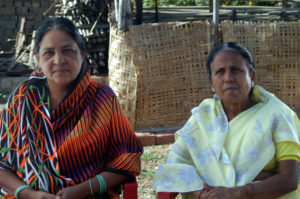
(Photo by Terry Allan)
The two women first met as employees at a stationery factory in 1986 where they founded an independent union to fight for better labour conditions and wages (traditionally male-dominated unions would not accept them). In 1989, they led a 750 km march to New Delhi, presented a petition to the Prime Minister, and won a wage raise and other important concessions. Rashida Bee and Champa Devi Shukla, however, were destined to fight a much bigger battle – to seek justice for the victims of the 1984 Bhopal Gas Tragedy.
On December 2, 1984, the world’s worst industrial disaster occurred in Bhopal, India. Twenty-seven tons of lethal gases including methyl isocyanate (MIC) leaked from Union Carbide’s pesticide factory and blanketed the entire city. More than 8000 victims died in the few days following the disaster. The gases poisoned more than 500,000 people, leaving them with a lifetime of ill health and mental trauma. Most of the victims were poor people living in the slums that surrounded the factory. Many of them worked as daily-wage labourers and became too weak to do any strenuous work.
Bee and Shukla are themselves survivors of the tragedy. Since 1984, Bee has lost six family members to cancer caused by the exposure to the lethal gas. Shukla, who has one grandchild born with congenital deformities, lost her husband. Her health has deteriorated too. Buoyed by their success with the labour union, the two women decided to join the Bhopal struggle. The long-suffering victims have found new hope in Bee and Shukla. The duo have ignited the international campaign to seek justice for the survivors.
The two women have drawn poor and illiterate women like themselves from the margins of society to the centre of an unequal struggle. The aim was to hold Union Carbide and its successor Dow Chemical accountable for the disaster, bring the executives to trial, get them to provide long-term health care and economic support to survivors and their children, and to clean up the site.
In 2002 Bee and Shukla organized a 19-day hunger strike in New Delhi to press their demands. In 2003, they confronted Dow officials at their offices in Mumbai and the Netherlands with hand-delivered samples of toxic waste. They also toured more than 10 cities across the US ending with a passionate protest at Dow’s shareholder meeting in Michigan and a 12-day hunger strike on New York’s Wall Street. They are also party to the case against Union Carbide filed in US by the survivors.
Their leadership has energized the International Campaign for Justice in Bhopal and catapulted the issue onto the global stage once more. In their journey, Bee and Shukla have had to overcome poverty, their status as women in a male-dominated society, and, in Bee’s case, illiteracy. They have also had to struggle with chronic health problems.
The two women have worked together in a complementary way. Bee’s oratory and Shukla’s quiet diligence and strength have together made a powerful combination. For their selfless contribution to the cause of Bhopal survivors, they were awarded the Goldman Environmental Prize in 2004. With the prize money, they set up the Chingari Trust Rehabilitation Centre. It is the only place which treats children born with defects as a result of either gas exposure or water poisoning free of charge and has been helping affected children since 2007.
Afterword: This is a remarkable story of how two women with very different religious and social backgrounds came together to fight for justice for so many years. They have more work to do since real justice has eluded the victims until now.
There are a few videos on the work of the two women on YouTube. You can watch their acceptance speech at the 2004 Goldman Environmental Prize ceremony in San Francisco, California, here.

We have had one more incident in the very recent past at Vishakapatnam in Andrapradesh, where styrene vapours swept through the area at night on 8th May from a Company, LG Polymers Ltd. Eleven were killed immediately and hundreds have been hospitalised. We are not sure, how many more have died since then. Though the incident is minor when compared to Bhopal gas tragedy, the crux of the issue is why does the government allow such toxic industries in the vicinity of human populace. Such incidents offer lessons from time to time, but we tend to get complacent over time. This is a human tragedy. It is good to see people fighting for their rights and I appreciate the women in focus.